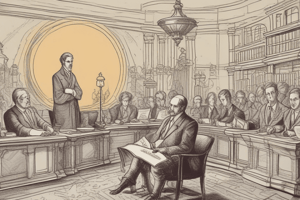Podcast
Questions and Answers
What does the principle of separate legal personality indicate about a company?
What does the principle of separate legal personality indicate about a company?
- A company acquires a distinct personality that is separate from its owners. (correct)
- A company cannot own property independently of its managers.
- A company has contractual limitations consistent with its owners.
- A company’s identity depends entirely on its shareholders.
What does the veil of incorporation protect shareholders from?
What does the veil of incorporation protect shareholders from?
- Having perpetual existence as a company.
- Owning property independently.
- Being able to enter into contracts.
- Being held liable for the company's debts. (correct)
Under what circumstance can the veil of incorporation be pierced?
Under what circumstance can the veil of incorporation be pierced?
- When there is only one shareholder involved.
- Whenever a company is profitable.
- When shareholders properly inform others of their business transactions.
- When it is used to evade legal liabilities or limitations. (correct)
According to the content, what is a key consequence of a company's perpetual existence?
According to the content, what is a key consequence of a company's perpetual existence?
What did Lord Denning argue regarding groups of companies?
What did Lord Denning argue regarding groups of companies?
In which case was the notion of lifting the veil discussed in relation to evasion of liability?
In which case was the notion of lifting the veil discussed in relation to evasion of liability?
The agency argument can be used in limited cases to challenge which principle?
The agency argument can be used in limited cases to challenge which principle?
What is a key aspect of a company's contractual capacity as mentioned in the content?
What is a key aspect of a company's contractual capacity as mentioned in the content?
What case established the principle of separate corporate personality?
What case established the principle of separate corporate personality?
Which of the following best describes the concept of separate corporate personality?
Which of the following best describes the concept of separate corporate personality?
Which term best describes the legal distinction that allows a company to act on its own behalf?
Which term best describes the legal distinction that allows a company to act on its own behalf?
What implication arises from the principle of separate legal personality?
What implication arises from the principle of separate legal personality?
In which type of case would the principle of separate corporate personality be most relevant?
In which type of case would the principle of separate corporate personality be most relevant?
What major change in understanding does the separate corporate personality provoke in terms of liability?
What major change in understanding does the separate corporate personality provoke in terms of liability?
Which case is NOT related to the concept of separate corporate personality?
Which case is NOT related to the concept of separate corporate personality?
What does the separate corporate personality principle protect shareholders from?
What does the separate corporate personality principle protect shareholders from?
What is a principal decision established in Salmon v Salmon?
What is a principal decision established in Salmon v Salmon?
Under what circumstances can the corporate veil be pierced according to the established principles?
Under what circumstances can the corporate veil be pierced according to the established principles?
What does the principle of nomineeship refer to in corporate law?
What does the principle of nomineeship refer to in corporate law?
In Adams v Cape Industries, what was reaffirmed regarding corporate personality?
In Adams v Cape Industries, what was reaffirmed regarding corporate personality?
What aspect did Lord Nueberger highlight in Prest regarding the court's analysis?
What aspect did Lord Nueberger highlight in Prest regarding the court's analysis?
In the case of Akhmedova v Ackmedova, what was the wife’s contention regarding corporate assets?
In the case of Akhmedova v Ackmedova, what was the wife’s contention regarding corporate assets?
What was the main legal issue in Urban Development Corp v Jacitiar?
What was the main legal issue in Urban Development Corp v Jacitiar?
What does the corporate veil generally protect according to the principles discussed?
What does the corporate veil generally protect according to the principles discussed?
Flashcards
Separate Legal Personality
Separate Legal Personality
A company is treated as a distinct entity from its owners, not liable for their debts or personal actions
Veil of Incorporation
Veil of Incorporation
A legal barrier that protects shareholders from personal liability related to the company's actions
Piercing the Veil
Piercing the Veil
When a court disregards the separate legal personality of a company and holds shareholders personally liable
Agency
Agency
Signup and view all the flashcards
Group of Companies
Group of Companies
Signup and view all the flashcards
Perpetual Existence
Perpetual Existence
Signup and view all the flashcards
Contractual Capacity
Contractual Capacity
Signup and view all the flashcards
Company Ownership of Assets
Company Ownership of Assets
Signup and view all the flashcards
Separate legal entity
Separate legal entity
Signup and view all the flashcards
Fiduciary duty
Fiduciary duty
Signup and view all the flashcards
Conflict of interest
Conflict of interest
Signup and view all the flashcards
Section 93 Safe Harbor
Section 93 Safe Harbor
Signup and view all the flashcards
Corporate Personality
Corporate Personality
Signup and view all the flashcards
Disclosure of Interest
Disclosure of Interest
Signup and view all the flashcards
Duty to Avoid Conflicts
Duty to Avoid Conflicts
Signup and view all the flashcards
Salmon v Salomon
Salmon v Salomon
Signup and view all the flashcards
Corporate Veil
Corporate Veil
Signup and view all the flashcards
Piercing the Corporate Veil
Piercing the Corporate Veil
Signup and view all the flashcards
Abuse of Separate Legal Personality
Abuse of Separate Legal Personality
Signup and view all the flashcards
Nominee Company
Nominee Company
Signup and view all the flashcards
Adams v Cape Industries
Adams v Cape Industries
Signup and view all the flashcards
Gilford Motor Co v Horne
Gilford Motor Co v Horne
Signup and view all the flashcards
Akhmedova v Akhmedov
Akhmedova v Akhmedov
Signup and view all the flashcards
Study Notes
Notice of Credit and Plagiarism Disclaimer
- These notes were compiled using various textbooks and websites
- Full credit is given to the authors of those sources.
- Users are advised to paraphrase all material.
- The author of this document is not liable for any plagiarism by users.
Table of Contents
- Company law Topic and Lecture notes: 1
- Topic 1 - Separate Legal Entity- Principle of Corporate Personality: 7
- Summary: 7
- Adams v Cape Industries Plc: 8
- VTB Capital v Nutriteck: 9
- 1A. Introduction: 9
- Salomon v Salomon: 10
- B. The vail of incorporation: 11
- 1.B.i Consequences of the veil of incorporation: 12
-
- The company has perpetual existence/succession – a life of its own: 12
-
- The company has a contractual capacity: 13
-
- The Doctrine of Sperate ownership of property: 14
-
- C. Piecing the Corporate Vail: 14
- Gilford Moto Company v Horne and Another: 15
- Commentary: 15
- Jones v. Lipman [1962] 1 WLR 832: 16
- Commentary: 16
- Donovan Crawford v Financial Institutions Services Ltd [2003] UKPC 13: 16
- NOTE- Agency: 17
- 1.B.i Consequences of the veil of incorporation: 12
- Smith Stone & Knight Ltd v. Birmingham Corporation [1939] 4 ALL ER 116: 17
- Topic 3 - Director's duties: 32
- Summary: 33
- Who and what is a director: 34
- 3.1 Introduction: 34
- 3.2 Definition of Director: 35
- Who is a director?: 35
- 3.3 De facto, De jure directors and Shadow Directors: 35
- A. De facto Directors: 36
- Re Hydro-dam 1994: 36
- B. Shadow Directors: 37
- Secretary of State for Trade and Industry v Devrell 2001: 38
- 3.4 The board of directors and the duties imposed: 39
- Section 60 – The Management Mandate: 40
- Commentary: 40
- Statutory fiduciary and non-fiduciary duty: 40
- Section 99 – Director's Duties: 41
- Commentary on section 99: 42
- Unanimous shareholder agreement: 43
- Section 137(2): 43
- 3.4. A- The non-fiduciary duties of the directors under 99(1)(b): 43
Studying That Suits You
Use AI to generate personalized quizzes and flashcards to suit your learning preferences.




